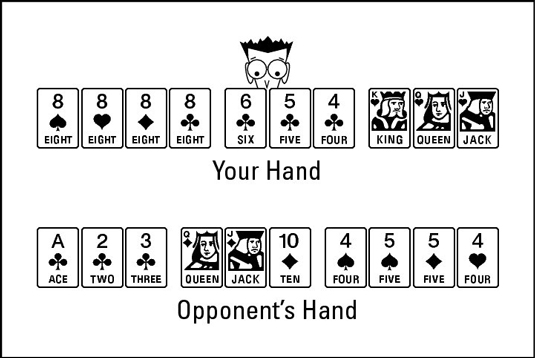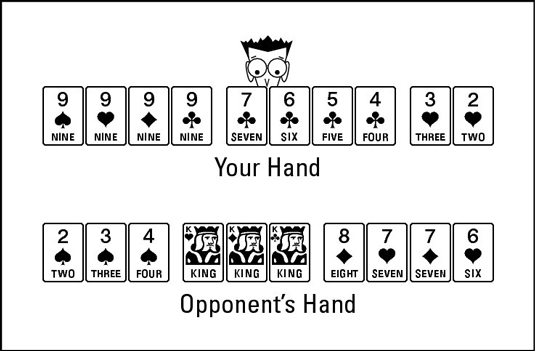Ready to learn how to play gin rummy but don't know where to start? This classic two-player card game is similar to regular rummy, but with a few extra twists. The goal of gin rummy is to form your ten cards into combinations called melds. You can win by "going gin" (melding all your cards at once for a 25-point bonus) or by "knocking" when your unmelded cards, or deadwood, total 10 points or less. Mastering these two ways to go out is the key to tallying up points and winning the game. Read on for a step-by-step guide to playing gin rummy.
To play gin rummy, you need the following:
- Two players: If more than two people want to play, you may want to send the extras out for ice cream or a walk.
- A standard deck of 52 cards; no jokers are allowed in the gin house.
- Paper and pencil for scoring.
How to deal in gin rummy
Both players get ten cards. The dealer turns the rest of the cards into the stock by placing them in the center of the table and turning over the first card. The
Gin rummy play resembles regular rummy, except for how you go out, and the fact that you do not put down combinations mid-hand.
The first upcard is a free card; be prepared to take it, even if it has no relevance to your hand because the option reverts to your opponent if you don’t take advantage of it. If nothing else, taking the card misleads your opponent about the combinations in your hand. You cannot take up the discard and then immediately put it down — just as at rummy.
How to go gin and how to score in gin rummy
The most difficult (and therefore rewarding) way to go out and win the game is to put all your cards into melds, which is called going gin. If you go gin, you score 25 points, plus the sum of whatever your opponent fails to make into complete combinations — their unconnected cards, or deadwood.
You must pick up a card, either from the stock or the discard pile, before you go gin.
To better understand how to score points after you win, take a look at the cards in this figure.

The winner collects points from the deadwood in the loser’s hand.
The example opponent has 18 points left: two 4s and two 5s add up to 18 points. Together with the 25 points you get for going gin, you score 43 points.
You can play to 100 or 250 points, depending on how long you want the contest to last.
How do you go out by knocking in gin rummy?
The most intriguing facet of the rules of gin rummy, compared to the standard rummy rules, is that you have more than one way to go out. Instead of forming all your cards into combinations, you have the option to knock (which involves literally tapping the table).
You knock when
- You've put almost all your cards into combinations and
- The cards that don’t make melds total less than or equal to 10 points.
If you meet these criteria, you can knock (just once will do — no matter how happy it makes you feel) and then put your cards down on the table.
After you knock, play stops, and the tallying begins. Your score comes from the deadwood — the cards that aren’t part of combinations. If your opponent’s deadwood exceeds yours, you pick up the difference between your total and theirs. If your opponent’s deadwood doesn’t exceed yours, you must face the consequences.
Sometimes your opponent can outdo you when you knock because they have an additional way to get rid of his deadwood. They can put down their melds, and those cards don’t count toward their score. They can also add their loose cards to your combinations. After your opponent adds any loose cards, only their remaining cards count.
Take a look at the cards in this figure to get an idea of how to score after you knock.

Someone’s knocking at the door; someone’s racking up some points.
If you count up all the cards in this figure, you see that your 5 points against the opponent's 28 leaves you with 23 points.
If you knock, you don’t get 25 points for going out.






